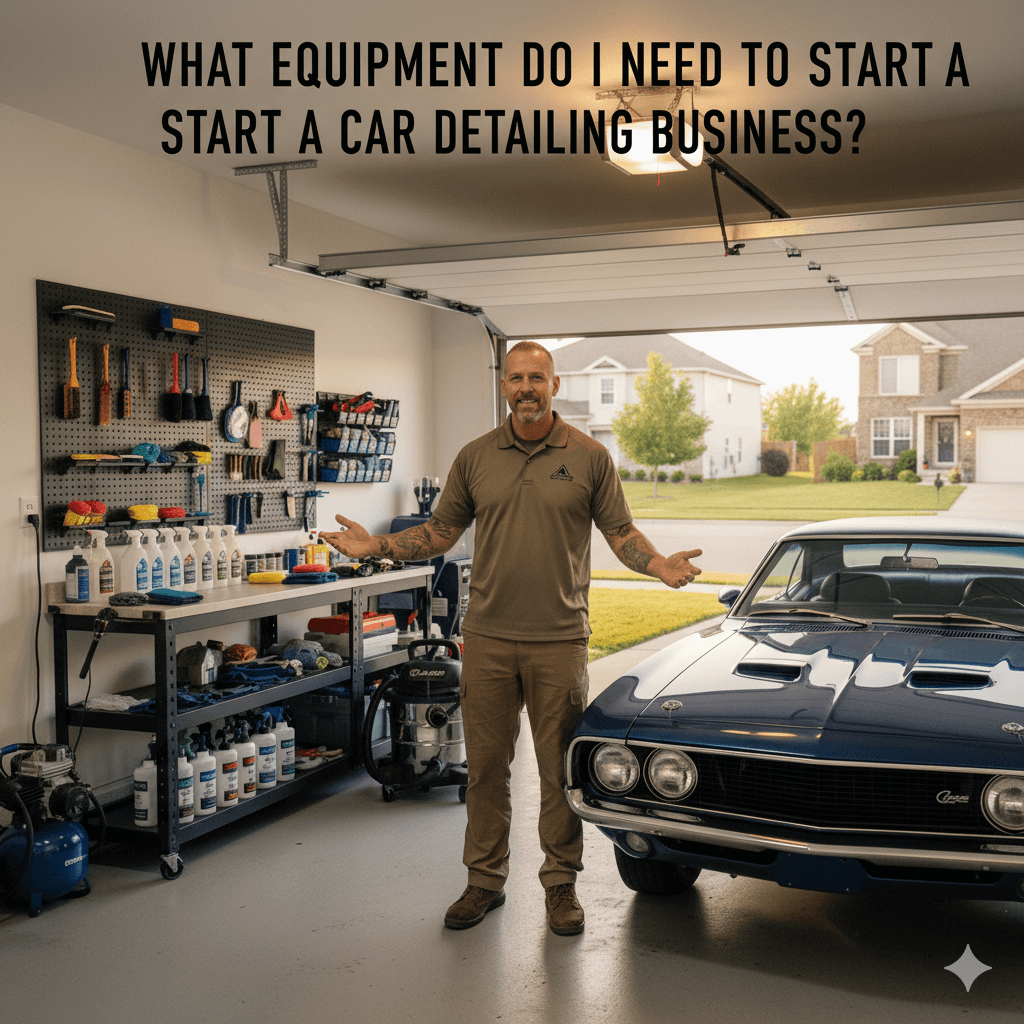
By a 60-year-old auto detailer who’s been buffing chrome and scrubbing interiors since the late 80s.
Introduction: The First Step Is Always Tools
I’ll never forget my first detailing setup back in the late 80s. I had a bucket, a sponge that scratched more than it cleaned, and a can of paste wax that smelled like bananas. Did I make mistakes? Oh, plenty. But those humble beginnings taught me a lesson every new detailer needs to hear: your equipment is the backbone of your business.
If you’re asking, “What equipment do I need to start a car detailing business?” you’re already thinking like a pro. Tools don’t just help you clean cars—they help you earn trust, save time, and keep customers coming back.
So let’s roll up our sleeves and go through every piece of essential gear, from the basics you can’t live without to the pro-level tools that separate hobbyists from real business owners.
Why the Right Equipment Matters
Before I dive into the checklist, let me explain why equipment is so important.
- Quality Work = Repeat Business. A cheap vacuum won’t pull up dirt hidden in carpets, and customers will notice.
- Efficiency = Higher Earnings. Good tools cut job time in half. That means more cars, more income.
- Durability = Lower Costs. Buy once, cry once. Cheap gear breaks, and downtime costs money.
- Safety. Both for the car and for you. Wrong tools can scratch paint or wear down your body.
Think of it like cooking. Sure, you can fry an egg in a cheap pan. But if you’re running a restaurant, you’d better have pro-grade cookware.
Essential Equipment Checklist for Starting a Car Detailing Business
Here’s the starter kit every detailer needs. I’ll break it into categories.
1. Exterior Detailing Equipment
This is where first impressions are made.
- Pressure Washer – Invest in an electric or gas model. I use a 2,000+ PSI electric unit for most cars. (Tip: too much pressure can strip paint).
- Foam Cannon – Attaches to your pressure washer, lays down thick soap that lifts dirt safely.
- Buckets (at least 2) – One for soap, one for rinsing. Pro tip: always use a grit guard at the bottom to avoid scratches.
- Microfiber Wash Mitts – Ditch the old sponge. A mitt holds more soap and is gentler on paint.
- Drying Towels – Big, plush microfiber towels beat chamois any day.
Nostalgia moment: Back in the day, we dried cars with bath towels. Swirl marks galore! Customers didn’t know better, but now they do.
2. Interior Detailing Equipment
This is where customers really feel your work.
- Shop Vacuum (Wet/Dry) – Strong suction, big tank, reliable. Don’t skimp here.
- Steam Cleaner – Great for carpets, seats, and even killing germs. Families love this.
- Brush Kit – Different sizes for vents, leather, carpets, and cracks.
- Extractors – For deep cleaning carpets and upholstery. Brands like Mytee are detailer favorites.
- Odor Eliminators – Ozone machine or enzymatic sprays. (No, air fresheners don’t count).
I once had a minivan come in after a milk spill sat for two weeks in July. Without an extractor and odor removal, that car would’ve been unsalvageable.
3. Polishing & Paint Correction Equipment
This separates amateurs from pros.
- Dual-Action Polisher – Safer than a rotary for beginners. It’s your best friend for removing swirls and scratches.
- Polishing Pads (variety pack) – Cutting, polishing, finishing. Each has a role.
- Compounds & Polishes – Meguiar’s, 3D, or Menzerna are trusted brands.
- Paint Depth Gauge – Advanced, but useful when correcting older cars with thin paint.
Think of polishing like surgery. The right tool can revive a tired car. The wrong one can burn through paint faster than you can say “oops.”
4. Protection Equipment
Once the car shines, lock in that look.
- Wax (liquid or paste) – Old-school, still works.
- Sealants – Last longer than wax.
- Ceramic Coatings – The new gold standard. Customers love the water-beading effect.
- Applicators & Buffing Towels – Always use clean, high-quality microfiber.
5. Miscellaneous but Crucial Tools
These are the unsung heroes.
- Detailing Cart – Keep tools organized, save steps.
- Extension Cords & Hose Reels – Less tripping, more working.
- Gloves & Safety Gear – Protect your hands and lungs.
- Portable Lighting – Swirls hide in shadows. Good lighting reveals everything.
Step-by-Step: Building Your Starter Kit on a Budget
Not everyone has $10k to drop on gear. Here’s how to prioritize:
- Start with Basics – Buckets, mitts, towels, vacuum. ($500–$800).
- Add Pressure Washer + Foam Cannon – Big jump in efficiency. ($500–$1,000).
- Invest in Polisher + Pads – Unlock paint correction services. ($300–$600).
- Upgrade with Extractor + Steam Cleaner – Adds premium interior jobs. ($800–$2,000).
- Expand into Coatings & Sealants – High-profit upsells. ($500+).
Mistakes Beginners Make With Equipment
- Buying cheap, then buying again. Been there, done that.
- Overbuying fancy tools too early. Don’t buy a $1,500 extractor if you don’t have steady clients yet.
- Ignoring maintenance. A clogged polisher or dirty extractor will ruin your day.
- Forgetting backup supplies. Running out of microfiber towels mid-job is a rookie move.
Pro Tips From 30+ Years
- Always label towels: interior, exterior, glass. Mixing them = disaster.
- Keep a “go-bag” for mobile jobs. Nothing worse than forgetting your foam cannon.
- Learn how to properly clean and maintain pads, brushes, and towels. They last twice as long.
- Build relationships with suppliers—you’ll get discounts and insider deals.
Key Takeaways (Summary Box)
✅ Start simple, then expand as you grow.
✅ Focus on quality tools that save time and protect cars.
✅ Prioritize essentials: pressure washer, vacuum, polisher, microfiber.
✅ Upgrade with extractors, steamers, and coatings for premium services.
✅ Your equipment is your reputation—treat it like gold.
FAQs: Equipment for Car Detailing Business
1. Can I start a detailing business with just basic supplies?
Yes, buckets, mitts, towels, and a vacuum can get you started. But you’ll need upgrades to compete.
2. What’s the most important equipment to buy first?
A strong vacuum and quality microfiber towels. They touch every job.
3. Do I need a pressure washer?
Not at first, but it makes you faster and more professional. Customers notice.
4. How much should I budget for startup equipment?
Anywhere from $1,500 (bare bones) to $10,000+ (full shop setup).
5. Should I buy new or used equipment?
Buy new for tools that wear down (polishers, towels). Used can work for vacuums and extractors if inspected carefully.
Conclusion: The Tools Make the Detailer
So, what equipment do you need to start a car detailing business? The short answer: less than you think, but more than just soap and water.
The right gear transforms you from a car washer into a professional detailer. It builds customer trust, protects vehicles, and makes your life easier.
When I look back at my career, I wish I’d invested in better equipment earlier. My knees, back, and first dozen unhappy customers would’ve thanked me.
But here’s the good news—you don’t have to repeat my mistakes. Start smart, invest wisely, and grow as your business grows. Before long, you’ll be the one passing down advice to the next generation of detailers.
So, are you ready to pick up that polisher, fire up that vacuum, and get started? Your future clients—and their cars—are waiting.
👉 Related Articles:
- [Is Car Detailing Business Worth It?]
- [How to Start a Mobile Detailing Business the Right Way]
- [Top 10 Mistakes New Detailers Make and How to Avoid Them]

